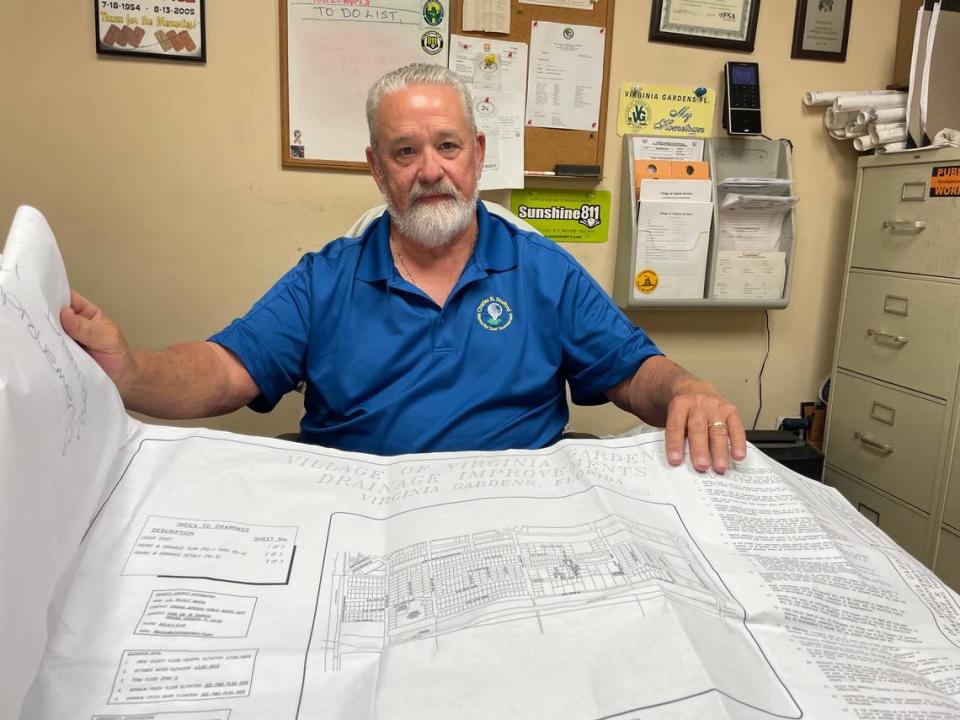In a small Miami suburb, plans to help street flooding are gutted by a DeSantis veto
The backhoe tearing up a dead-end street in Virginia Gardens on Friday morning marked the beginning of another small win against street flooding, a project backed by state funding last year. A short walk away, an idle neighborhood thoroughfare still drying out from this week’s rains represented the promise of more progress now halted by a governor’s veto.
With a population of less than 2,500, the village north of Miami International Airport relied on the $850,000 in state funding it received last year to pay the seven-man excavation crew working in a trough 15 feet below sidewalk level. New pipes and a cement basin will help funnel rainwater from the street above into the ground below, where it can eventually flow into a nearby canal.
READ MORE: All the rain in Miami and Fort Lauderdale did that? Take a look at what people posted
Until this week, Virginia Gardens planned to construct another 15 of the streetside drainage systems in other flood-prone areas of town, using $700,000 that Florida lawmakers put in the 2025 budget in March. But that plan died June 12 when Florida Gov. Ron DeSantis vetoed a list of projects totaling about $1 billion, including the Virginia Gardens package.
Without the state dollars to pay for nearly all of the planned drainage work, Virginia Gardens will put the flood-control efforts on hold after crews finish the first phase of the project.
“We just don’t have the funds to do something like this,” J.W. “Butch” Martin, the village’s part-time director of public works, said as a backhoe operator scooped soggy dirt out of a trench on the south side of 38th Street.

The Virginia Gardens project was one of roughly two dozen projects related to stormwater or drainage that DeSantis vetoed on Wednesday, surprising even his Republican allies who are used to municipal sewer funding surviving the governor’s yearly pruning of Legislature-approved spending.
The Tampa Bay Times reported that about $205 million related to water infrastructure, including local sewage systems and water-treatment plants, was on the veto list. That included $350,000 for stormwater improvements in the Golden Gate neighborhood of Coral Gables and $400,000 for new drains in Biscayne Park.
The vetoes came as a tropical system was dumping what would be close to 2 feet of rain in northern Miami-Dade and the Hollywood area. Rains were heavy enough that streets flooded across Miami-Dade, including spots in Virginia Gardens on tap to get drainage improvements from the new state funds.

“It added insult to injury,” Spencer Deno IV, the village’s mayor, said of learning about the vetoes during the flooding. “We need the money.”
Democrats pointed to the vetoes as more evidence that DeSantis is minimizing the opportunities for Florida to invest in measures mitigating rising seas and other challenges related to climate change.
“This is part of a long-standing record of Republicans ignoring reality, like climate change,” said state Rep. Ashley Gantt.
Last month, DeSantis signed a bill passed by the Republican-controlled Legislature that removed a directive to address climate change as an element of the state’s energy policy. “We don’t want our energy policy driven by climate ideology,” DeSantis said at a press conference in Hollywood on Friday.
The Virginia Gardens veto barely measures on the fiscal scale of Florida’s budget, which includes $116 billion of spending over 12 months starting July 1. DeSantis’s office said this week there is $535 million in the state budget for water projects, including pollution-reducing upgrades for sewer systems and $20 million to help reduce stormwater runoff into Biscayne Bay.
The governor’s press office declined to comment on the Virginia Gardens veto beyond a general statement that DeSantis made spending decisions in the best interest of Florida.
In comments to reporters this week, DeSantis said he still expects the water projects to get funded and asked local governments to request money through the state Department of Environmental Protection. “All those needs will be met,” he said.
State Rep. Alex Rizo, a Republican representing Virginia Gardens in the Florida House, said he’s gotten the same message in speaking to other lawmakers trying to figure out next steps after the stormwater vetoes. “There is help on the horizon,” he said.
Rizo said he had assumed the Virginia Gardens stormwater grant would be safe after it passed the Legislature. “I was a little surprised,” he said of the veto. “Obviously South Florida being mostly reclaimed swamp land, there’s not a lot of place for the water to go. So we need these projects.”
In Virginia Gardens, the state dollars would have meant new drainage pipes and street-level grates in the parts of town not covered by the first grant. That includes Northwest 38th Terrace, a low-lying neighborhood street that village police shut down during this week’s downpours.
Water on one side was pooling high enough that a passing truck could have sloshed enough water to push it into people’s homes, Mayor Deno said.
“On the south side, we have homes with just one step to get in,” he said, referring to the lower side of the street. “The water would have been up inside those homes for sure.”
While Martin, the public works director, said there’s a chance 38th Terrace could have stayed open in future heavy rain events with the improvements the Legislature had approved, he cautioned that even big state dollars only go so far during extreme rain events.
“You’re not going to be able to keep up,” he said. “You can always make things better. But you can’t make them perfect.”
Miami Herald staff writers Alexandra Glorioso and Max Greenwood contributed to this report.


